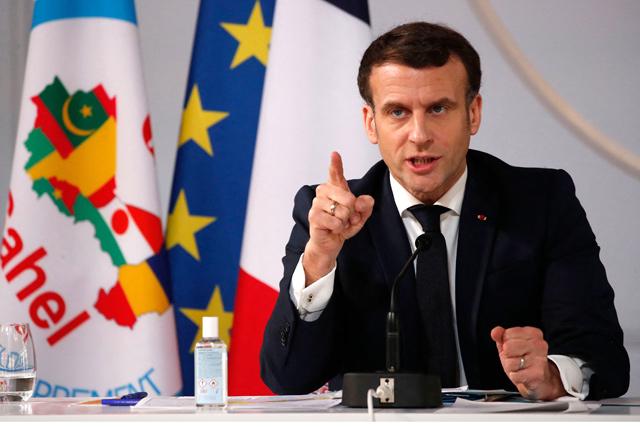- International News
- Web-2021-02-17 | 03:34 pm

Nayrouz News Agency :
President Emmanuel Macron on Tuesday pledged no "immediate" reduction in the 5,100 French troops fighting an Islamist insurgency in western Africa, but also set out his strategy for a far lighter presence over time.
Calls have risen in France for a review of the Barkhane force deployed in the Sahel region, which aims to curtail the terrorism threat while training local security forces, following a series of deadly attacks on French troops.
"Changes that are likely to be significant will be made to our military deployment in the Sahel when the time comes, but they will not be made immediately," Macron told reporters after a video-linked summit with the leaders of Burkina Faso, Chad, Mali, Mauritania and Niger.
"They will result first of all from a collective discussion with our Sahel partners and with the partners who have accepted to help us, and they will be based on the results obtained and the degree of engagement from our partners," he said.
He said that the leaders who took part in the summit from the Chad capital N'djamena had personally warned him against the dangers of a rapid pullout.
"A French withdrawal, a massive withdrawal of men, which is a possibility I have considered, would be a mistake," Macron said.
"It would be paradoxical to weaken our deployment at a time when we have a political and military alignment that enables us to reach our goals."
'Evolution of our presence'
France first sent troops into Mali in early 2013 to defeat Islamist insurgents that had seized control of the country's northern half, with the Barkhane operation formally starting in August 2014.
The force has claimed successes on the ground, notably the June 2020 killing of Abdelmalek Droukdel, the leader of Al Qaeda in the Islamic Maghreb.
But Macron, who faces a re-election fight next year, is also aware of the perils faced by French soldiers, 50 of whom have now been killed since 2013.
Macron indicated that he would reassess the situation after the summer, saying there should be an "evolution" of the French contingent into a lighter presence.
"In the coming months we will not change our presence. We hope that we will have concrete results in terms of security in the very next months, for me this means between now and the summer," Macron said.
"Beyond summer, I want to work with our partners for an evolution of our presence to consolidate our military victory in the region," he added.
Without giving a timescale, he indicated that over time the work should be taken over by the French-led Takuba multinational task force.
He said the aim was to have a 2,000-member Takuba force, with a French contingent of 500 soldiers at its core, in close cooperation with the national armies of the region.
The fledgling Takuba force has already seen Czech, Swedish and Estonian troops deployed in the region.
"We are not going to do this immediately but this is what envisage over time," Macron said.













